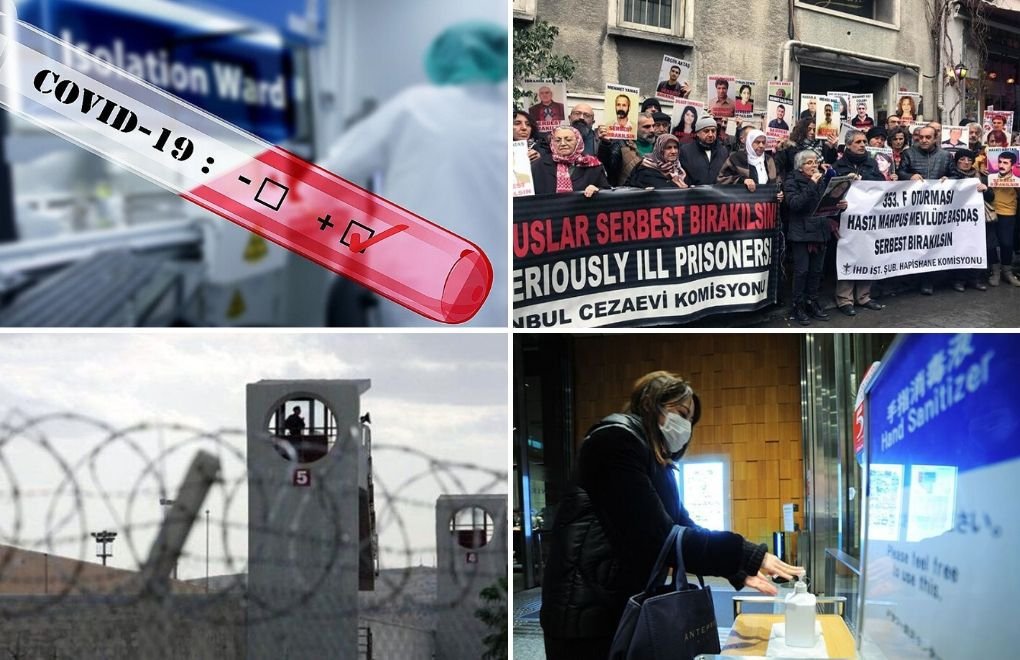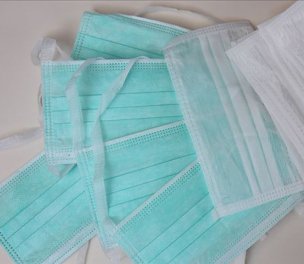Photos: Anadolu Agency, Twitter
Click to read the article in Turkish
Turkey should take necessary precautionary measures in prisons against the coronavirus outbreak, otherwise, it will have "grave consequences," rights defenders and lawyers warned.
The Ministry of Health confirmed today (March 11) the first Covid-19 case of the country.
There are more than 270 thousand prisoners in the country of 80 million and rights groups frequently report violations regarding the right to access to healthcare, especially for ill prisoners.
What measures can be taken for inmates and prison officers?
"An urgent action plan should be made for prisons. You know, at least 20 people stay in 10-person wards. In such a crowded environment, [finding] a solution is also difficult. If the virus spreads to a person, it will quickly spread to an entire ward," says Berivan Korkut, the Advocacy Coordinator of the Civil Society in Penal System Association.
She suggests that lower-income prisoners should be provided with cleaning kits and toilets and bathrooms in all prisons should be disinfected.
Facts about Turkey's prisons
|
Inmates should be tested for coronavirus and wards with infected inmates should be quarantined, she further said.
"Correction officers who engage in dialogues with thousands of inmates should also be protected like health workers.
"Inmates older than 65 years old should be taken out of crowded wards. Inmates who are in the risk group, who have chronic diseases should also be taken to private places where they wouldn't contact other inmates," she says, adding that the same measures should be taken for correction officers older than 65 years old or in the risk group.
Nutritional supplements should also be provided, especially vitamin D supplements, Korkut notes.
How are the hygiene conditions in prisons?
Rights to shelter, access to healthcare and food are already violated and hygiene conditions are poor in prisons, attorney Gülizar Tuncer says.
"Occupancy rates are very high in prisons. Naturally, this will increase the spreading speed of the virus," she says, adding that inmates in open prisons, who regularly contact people outside can be "carriers" of the virus.
"I don't think any measures have been and will be taken in prisons, where there is no soap and hot water. To this day, we have not witnessed such a case.
"In such an environment, both inmates and wardens, and all employees are in danger. If sufficient precautions are not taken in prisons, the consequences will be grave.
"It is very difficult to fight such a disease in prison. Think of it from the point of view of the patient: No food, co clean air, no sun. The environment this disease wants is an environment where there is no sun, clean air."
| 'Wardens asked us if we had the flu' Barış Marhan from the Libertarian Lawyers Association says, "In a correctional facility we visited recently, wardens asked us, 'Do you have the flu?' There can't be a measure like this. In this sense, we can say that the state has not taken sufficient measures for prisons. I think the training of the staff is the first thing to do." |
Should inmates be released?
Turkey's prisons are overcrowded, with prisons in major cities such as İstanbul, Ankara and İzmir having three to four times more inmates than their capacity, which can increase the spread of the virus, according to attorney Gökmen Yeşil.
"This situation is a problem in itself. For example, inmates sleep under stairs," he says.
He also notes that inmates contact with people outside when they go to court hearings or during visitations.
Yeşil suggests that inmates remanded in custody could be put under house arrest. Although he criticizes the government for "arresting everyone who appears before a court" and says he is against house arrest in terms of freedoms, he suggests it as a legal way to reduce the crowd in prisons.
"Even if such a disease exists in prisons, there is no sufficient medical equipment to identify this," he says.
He suggests that all prison staff should be given medical training, hygienic conditions should be provided for both inmates and visitors, prisons should be disinfected.
| Violations against ill inmates According to an April 2019 report by the Human Rights Association (İHD), there are 1,333 ill prisoners in Turkey. The report said 457 of them were in serious condition. The last statement by the Ministry of Justice on the number of ill prisoners was in February 2017 and it said there were 841 ill prisoners. At least 2,300 people lost their lives in prisons from 2009 to October 2016, according to the same statement. Inmates also state that they are not taken to the infirmary or the hospital sometimes and doctors examine them while they are handcuffed. |
The situation of ill prisoners
Destina Yıldız from the prisons committee of the Libertarian Lawyers Association stresses that ill prisoners are more vulnerable to the disease.
"Prisons are not prepared enough for even normal diseases. I don't think there is preparation for such a disease. We saw some wardens wearing masks but that was in a few prisons.
"I think the possibility of the spread is limited in three-people cells. But access to cleaning products being limited and some prisons installing water meters can cause inmates to have problems in terms of cleaning.
"Prisons should be evacuated as fast as possible. The situation is even more critical for ill prisoners."
(EMK/VK)










-132.jpg)










